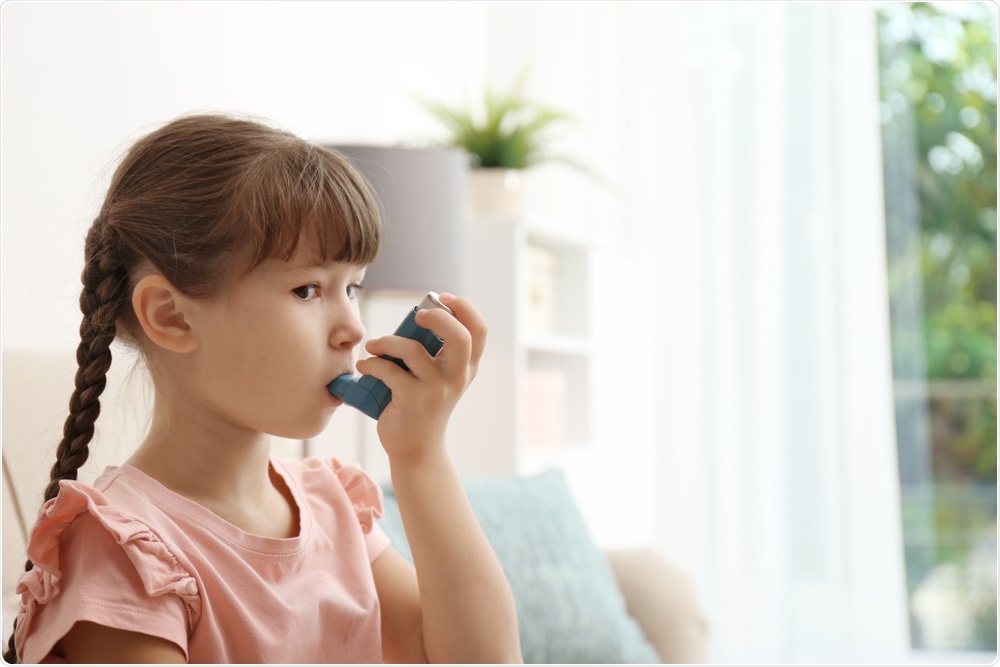The prevalence of hypertension, diabetes, cardiovascular diseases, and respiratory diseases are high-risk factors for severe coronavirus disease 2019 (COVID-19). COVID-19, which is caused by the severe acute respiratory syndrome coronavirus 2 (SARS-CoV-2), is a respiratory disease that has infected more than 195 million people worldwide and caused the deaths of over 4.18 million as of July 29, 2021.
 Study: Asthma and the Risk of SARS-CoV-2 Infection Among Children and Adolescents. Image Credit: New Africa / Shutterstock.com
Study: Asthma and the Risk of SARS-CoV-2 Infection Among Children and Adolescents. Image Credit: New Africa / Shutterstock.com

 This news article was a review of a preliminary scientific report that had not undergone peer-review at the time of publication. Since its initial publication, the scientific report has now been peer reviewed and accepted for publication in a Scientific Journal. Links to the preliminary and peer-reviewed reports are available in the Sources section at the bottom of this article. View Sources
This news article was a review of a preliminary scientific report that had not undergone peer-review at the time of publication. Since its initial publication, the scientific report has now been peer reviewed and accepted for publication in a Scientific Journal. Links to the preliminary and peer-reviewed reports are available in the Sources section at the bottom of this article. View Sources
Several studies have also suggested that individuals with asthma are less susceptible to SARS-CoV-2 infection and are at low risk of severe COVID-19. To date, asthmatic patients have represented only 1-2% of hospitalized COVID-19 patients across the world. Additionally, asthma was less prevalent among individuals testing positive for SARS-CoV-2 compared to individuals testing negative for the virus.
Notably, these studies focused primarily on adults. In this context, researchers from Duke University were interested in determining the COVID-19 infection risk in children between the ages of 5 and 17 with asthma.
To this end, the researchers evaluated the risk of SARS-CoV-2 infection by asthma status in children receiving health care in Durham County, North Carolina. They also evaluated how the use of inhaled corticosteroids (ICS) and the presence of comorbid atopic (sensitivity to allergens) diseases modified the association between asthma and the risk of SARS-CoV-2 infection.
Study results
The study included a cohort of 49,455 children and was conducted in the Duke University Health System (DUHS) during an eight-month period from March 1, 2020
to October 31, 2020. Of these children, 6,515 (13.2%) met the definition for asthma. Taken together, 1.1% of children tested positive for SARS-CoV-2 infection during the study period, of which 66 (1.0%) children had asthma and 498 (1.2%) children did not have asthma.
The researchers of the current study, which was published on the preprint server medRxiv*, found that asthma was associated with a lower risk of 35% of SARS-CoV-2 infection among children. This reduced risk remained true among asthmatic children who were prescribed an inhaled corticosteroid or had comorbid atopic diseases.
This finding suggests that these factors affect the susceptibility to SARS-CoV-2 infection. Interestingly, the researchers also found that none of the children with asthma who acquired SARS-CoV-2 had required hospitalization for COVID-19.
It was also noted that positive SARS-CoV-2 results were associated with non-White asthmatic children with self-pay insurance and from more deprived neighborhoods.
No evidence was found to support that asthma predisposes children to severe COVID-19, which is a helpful observation for healthcare providers and a relief for parents of asthmatic children.
Study implications
While previous research suggests that the use of ICS increases the risk of general respiratory tract infections before COVID-19, the current data shows that these medications do not increase susceptibility to SARS-CoV-2 infection or the severity of COVID-19 among children. On the contrary, this study indicates that ICS use may contribute to a lower risk of SARS-CoV-2 infection among children.
The researchers, therefore, emphasized the importance of continuing these medications during the ongoing COVID-19 pandemic. The use of ICS and comorbid atopic diseases may contribute to the association between asthma and SARS-CoV-2 susceptibility.
Several factors including a reduced expression of the SARS-CoV-2 host receptor angiotensin-converting enzyme 2 (ACE2), suppression of interferons, and relatively less exposure of asthmatic children to SARS-CoV-2 and risk mitigation strategies, may all contribute to the reduced susceptibility of asthmatic children to COVID-19.
Conclusion
Asthma is not associated with worse outcomes among children and adolescents with COVID-19. Evidently, children with asthma are at a lower risk of SARS-CoV-2 infection and generally have mild symptoms of COVID-19. Thus, the researchers strongly recommend that children with asthma continue their treatment and asthma action plans during the ongoing COVID-19 pandemic.

 This news article was a review of a preliminary scientific report that had not undergone peer-review at the time of publication. Since its initial publication, the scientific report has now been peer reviewed and accepted for publication in a Scientific Journal. Links to the preliminary and peer-reviewed reports are available in the Sources section at the bottom of this article. View Sources
This news article was a review of a preliminary scientific report that had not undergone peer-review at the time of publication. Since its initial publication, the scientific report has now been peer reviewed and accepted for publication in a Scientific Journal. Links to the preliminary and peer-reviewed reports are available in the Sources section at the bottom of this article. View Sources
Journal references:
- Preliminary scientific report.
Rao, S., Hurst, J. H., Zhao, C., et al. (2021). Asthma and the Risk of SARS-CoV-2 Infection Among Children and Adolescents. medRxiv. doi:10.1101/2021.07.20.21260871. https://www.medrxiv.org/content/10.1101/2021.07.20.21260871v1.
- Peer reviewed and published scientific report.
Rao, Saahithi, Jillian H. Hurst, Congwen Zhao, Benjamin A. Goldstein, Laine Thomas, Jason E. Lang, and Matthew S. Kelly. 2022. “Asthma and the Risk of SARS-CoV-2 Infection among Children and Adolescents.” Pediatrics 149 (6). https://doi.org/10.1542/peds.2021-056164. https://publications.aap.org/pediatrics/article/149/6/e2021056164/185387/Asthma-and-the-Risk-of-SARS-CoV-2-Infection-Among?autologincheck=redirected.